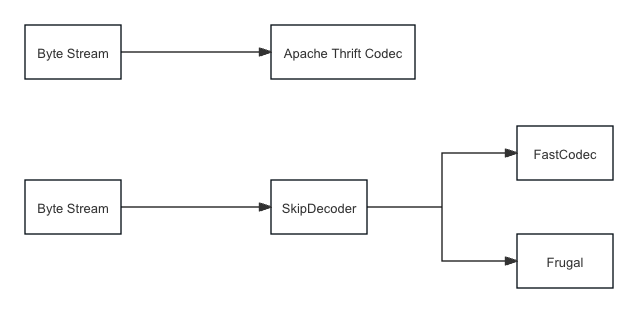SkipDecoder
Background
For Thrift serialisation protocols, the current Thrift Framed transport (e.g. TTHeader, TTHeaderFramed) uses FastCodec or Frugal for better performance, but for the sake of compatibility with the small number of services that use the Thrift Buffered transport, Kitex still generates Apache Thrift Codec code that conforms to the official interface requirements. (See Framed and Buffered protocols for details).
This part of the code is huge, averaging close to forty per cent, but there are very few scenarios where it can be used. Removing this part of the code will improve the IDE’s loading and compilation speed.
Currently thriftgo (>= v0.3.7) can use -thrift no_default_serdes to reduce code generation in this section:
kitex -thrift no_default_serdes path/to/idl
In order to remove this part of the code and still be compatible with the Thrift Buffered protocol, we introduced the SkipDecoder in Kitex v1.16.0 to achieve this goal.
Introduction to the principle
The Thrift Buffered protocol does not indicate the length of the Payload in the Header, so it is not possible to directly intercept the Payload for processing by FastCodec or Frugal.
It’s natural to think that we could avoid using the Apache Thrift Codec altogether by parsing the Thrift Buffered protocol byte-by-byte and feeding the full Payload to FastCodec and Frugal, which is exactly what SkipDecoder does.
Below is a comparison of the flow with and without SkipDecoder in the Thrift Buffered protocol scenario:

Trimming Effect
Take a very complex IDL for example
Before trimming:
117M kitex_gen
After trimming:
74M kitex_gen
Trims 36% of generated code, nearly 40%, with significant results.
Using
Remove the Apache Thrift Codec with
-thrift no_default_serdesand regenerate the code.kitex -thrift no_default_serdes path/to/your/idlThis feature requires thriftgo version >= 0.3.7, the latest version is recommended.
Configure SkipDecoder to be enabled
Please specify what the code generated in step 1 is used for:
Used to construct a Client to call downstream services
With FastCodec
import ( "github.com/cloudwego/kitex/pkg/remote/codec/thrift" "demo/kitex_gen/kitex/samples/echo/echoservice" ) func main() { cli := echoservice.MustNewClient("kitex.samples.echo", client.WithPayloadCodec(thrift.NewThriftCodecWithConfig(thrift.FastRead|thrift.FastWrite|thrift.EnableSkipDecoder)), ) }- With Frugal
import ( "github.com/cloudwego/kitex/pkg/remote/codec/thrift" "demo/kitex_gen/kitex/samples/echo/echoservice" ) func main() { cli := echoservice.MustNewClient("kitex.samples.echo", client.WithPayloadCodec(thrift.NewThriftCodecWithConfig(thrift.FrugalRead|thrift.FrugalWrite|thrift.EnableSkipDecoder)), ) }
Used to construct a Server for upstream calls
- With FastCodec
import ( "github.com/cloudwego/kitex/pkg/remote/codec/thrift" "demo/kitex_gen/kitex/samples/echo/echoservice" ) func main() { srv := echoservice.NewServer(handler, server.WithPayloadCodec(thrift.NewThriftCodecWithConfig(thrift.FastWrite|thrift.FastRead|thrift.EnableSkipDecoder)), ) }- With Frugal
import ( "github.com/cloudwego/kitex/pkg/remote/codec/thrift" "demo/kitex_gen/kitex/samples/echo/echoservice" ) func main() { srv := echoservice.NewServer(handler, server.WithPayloadCodec(thrift.NewThriftCodecWithConfig(thrift.FrugalWrite|thrift.FrugalRead|thrift.EnableSkipDecoder)), ) }
Attention
-thrift no_default_serdesmust be used with SkipDecoder.
Upstream uses
-thrift no_default_serdes, then upstream needs to enable SkipDecoder.If
-thrift no_default_serdesis used downstream, then SkipDecoder needs to be enabled downstream.Reducing Apache Thrift Codec code generation without turning on SkipDecoder can prevent deserialization.
- In order to identify problems that may occur when the SkipDecoder is turned on, the error messages are handled specially.
SkipDecoder parses the complete Payload period.
If there is an error in this process, it will contain the following error message:
caught in SkipDecoder NextStruct phaseSkipDecoder parses the Payload and passes it to FastCodec/Frugal for decoding. If there is an error in this process, it will contain the following error message:
Using FastCodec
caught in FastCodec using SkipDecoder BufferUsing Frugal
caught in Frugal using SkipDecoder Buffer
Performance
In SkipDecoder + FastCodec scenarios, deserialization is up to 10% more throughput compared to Apache Thrift Codec.
Benchmark_Unmarshal_apache/small 3763096 294.4 ns/op 1980.61 MB/s
Benchmark_Unmarshal_apache/medium 145512 7525 ns/op 2327.89 MB/s
Benchmark_Unmarshal_apache/large 6244 190503 ns/op 2329.64 MB/s
Benchmark_Unmarshal_fastcodec_skip/small 4549530 255.3 ns/op 2283.58 MB/s
Benchmark_Unmarshal_fastcodec_skip/medium 186720 6269 ns/op 2794.32 MB/s
Benchmark_Unmarshal_fastcodec_skip/large 7424 161485 ns/op 2748.27 MB/s